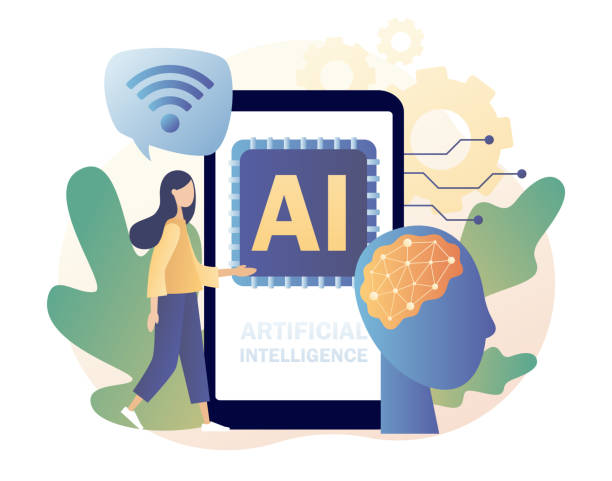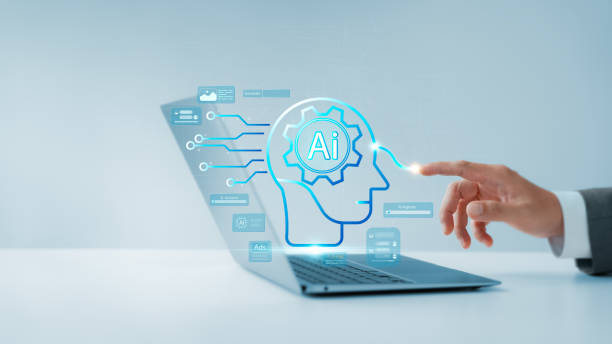What is Artificial Intelligence? Definitions and Basic Concepts

#Artificial_Intelligence (AI) is a branch of computer science that deals with building machines capable of performing tasks that usually require human intelligence.
This broad definition includes various fields such as machine learning, natural language processing, computer vision, and robotics.
In short, artificial intelligence seeks to create systems that can think, learn, and decide, just like humans.
Artificial Intelligence (AI) is increasingly penetrating our daily lives.
From movie and music recommendation systems to self-driving cars, AI is reshaping the world around us.
Machine learning is an important subset of artificial intelligence that allows machines to learn from data without being explicitly programmed.
Machine learning algorithms analyze data, identify patterns, and use these patterns to make predictions or decisions.
Natural Language Processing (NLP) enables machines to understand and generate human language.
NLP is used in applications such as machine translation, chatbots, and sentiment analysis.
Computer vision enables machines to see and interpret images.
Computer vision is used in applications such as facial recognition, self-driving cars, and quality control.
Are you dissatisfied with low sales on your online store?
Rasaweb is your solution for having a professional and high-selling online store.
✅ Significant increase in sales and revenue
✅ Easy and enjoyable shopping experience for customers
⚡ Get a free consultation from Rasaweb right now!
Types of Artificial Intelligence: From Narrow AI to General AI

Artificial intelligence can be broadly divided into two main categories: Narrow AI and General AI.
Narrow AI is designed to perform a specific task and performs very well at that task.
Examples of narrow AI include facial recognition systems, product recommendation systems, and self-driving cars.
These systems are very efficient at performing their specific tasks, but they cannot perform tasks for which they are not programmed.
Artificial General Intelligence (AGI) is a hypothetical type of AI that can perform any intellectual task that a human can.
AGI is still in the early stages of development and no AGI system currently exists.
Achieving AGI is a major challenge because it requires a deep understanding of human intelligence and the ability to mimic it in a machine.
In addition, there are important ethical considerations regarding the development of AGI, such as ensuring that AGI is used for the benefit of humanity.
Applications of Artificial Intelligence in Various Industries

Artificial intelligence is currently used in various industries and significantly improves performance and efficiency.
In the #healthcare industry, artificial intelligence is used for disease diagnosis, drug development, and providing personalized care.
In the financial industry, artificial intelligence is used for fraud detection, risk management, and providing customer service.
In the manufacturing industry, artificial intelligence is used to automate processes, improve quality, and reduce costs.
In the transportation industry, artificial intelligence is used to develop self-driving cars, optimize routes, and improve safety.
Also, artificial intelligence is used in education, entertainment, agriculture, and many other fields.
These applications show that artificial intelligence has a great potential to improve our lives.
For example, in retail, artificial intelligence is used to recommend products to customers based on their purchase history, optimize prices, and manage inventory.
In the energy industry, artificial intelligence is used to optimize energy production, predict demand, and detect potential problems in energy networks.
These applications show that artificial intelligence can help companies become more efficient, profitable, and sustainable.
| Industry | Application of Artificial Intelligence |
|---|---|
| Healthcare | Disease diagnosis, drug development |
| Financial | Fraud detection, risk management |
| Manufacturing | Process automation, quality improvement |
| Transportation | Self-driving cars, route optimization |
Machine Learning and Neural Networks: The Basis of Artificial Intelligence

Machine Learning and Neural Networks are two fundamental concepts in the field of artificial intelligence.
Machine learning allows machines to learn from data without being explicitly programmed.
This process involves using algorithms that analyze data, identify patterns, and use these patterns to make predictions or decisions.
Neural networks are computational models inspired by the structure of the human brain.
These networks consist of multiple layers of nodes (neurons) that are connected to each other.
Each node applies a mathematical function and transmits its output to the nodes of the next layer.
By training neural networks using large amounts of data, they can be used to perform complex tasks such as image recognition, natural language processing, and machine translation.
Deep Neural Networks are a type of neural network that have multiple layers and are capable of learning more complex patterns.
Machine learning algorithms are divided into two main categories: Supervised Learning and Unsupervised Learning.
In supervised learning, the model is trained using labeled data, while in unsupervised learning, the model is trained using unlabeled data.
Reinforcement Learning is another type of machine learning in which an agent is placed in an interactive environment and learns how to best act through trial and error.
Does your company’s website perform as befits your brand? In today’s competitive world, your website is your most important online tool. Rasaweb, a specialist in designing professional corporate websites, helps you to:
✅ Gain the credibility and trust of customers
✅ Turn website visitors into customers
⚡ Get a free consultation!
Current Challenges and Limitations of Artificial Intelligence

Despite significant advances in the field of artificial intelligence, there are still many challenges and limitations that need to be addressed.
One of the main challenges is the lack of high-quality training data.
Many artificial intelligence algorithms require large amounts of data to function optimally, but collecting and labeling this data can be time-consuming and costly.
Another challenge is the interpretability of artificial intelligence models.
Many complex models, such as deep neural networks, act like a black box, meaning that it is difficult to understand how they make decisions.
This issue can be problematic in applications that require transparency and accountability, such as medicine and law.
In addition, artificial intelligence still has limitations in the area of general understanding and reasoning.
Artificial intelligence systems often have difficulty performing tasks for which they have not been trained.
Also, there are important ethical considerations regarding the development and use of artificial intelligence, such as concerns about bias, discrimination, and job loss.
For example, facial recognition algorithms may be less accurate in recognizing people with dark skin tones.
Or automated robots may replace the human workforce and lead to widespread unemployment.
These issues require careful attention and consideration.
The Future of Artificial Intelligence: Predictions and Prospects

The future of artificial intelligence is bright and full of potential.
Artificial intelligence is expected to increasingly penetrate our lives in the coming years and transform various industries.
Advances in machine learning, natural language processing, and computer vision will lead to the development of smarter and more capable systems.
We will see more advanced self-driving cars, smarter virtual assistants, and more capable robots that can work in complex environments.
Artificial intelligence can also help solve major global problems such as climate change, hunger, and disease.
For example, artificial intelligence can be used to develop renewable energy, improve agricultural productivity, and develop new drugs.
However, it is important to approach the development of artificial intelligence responsibly and ethically.
We must ensure that artificial intelligence is used for the benefit of humanity and prevent the creation of bias, discrimination, and other negative consequences.
Education and awareness about artificial intelligence are also very important so that people can understand what artificial intelligence is and how it can affect their lives.
Investing in research and development in the field of artificial intelligence is also essential so that we can benefit from the full potential of this technology.
The Impact of Artificial Intelligence on the Labor Market: Opportunities and Challenges

Artificial intelligence will have a profound impact on the labor market, creating both opportunities and challenges.
On the one hand, artificial intelligence can automate repetitive and tedious tasks, increase productivity, and create new jobs.
On the other hand, artificial intelligence can replace the human workforce and lead to job loss, especially in jobs that require fewer skills.
To adapt to these changes, people need to learn new skills and prepare themselves for new jobs.
Education plays an important role in preparing the workforce for the future of artificial intelligence.
For example, the demand for artificial intelligence specialists, data scientists, and machine learning engineers will increase.
Also, jobs that require soft skills such as creativity, critical thinking, and communication skills will be less at risk of automation.
Governments, companies, and educational institutions must work together to develop training and retraining programs so that people can acquire the skills needed to succeed in the future labor market.
Also, policies should be considered to protect workers from the negative consequences of automation, such as providing unemployment benefits and supporting entrepreneurship.
| Impact of Artificial Intelligence | Opportunities | Challenges |
|---|---|---|
| Increased Productivity | Creating New Jobs | Job Loss |
| Task Automation | Need for New Skills | Income Inequality |
Ethics in Artificial Intelligence: Key Considerations

As artificial intelligence increasingly penetrates our lives, important ethical issues arise regarding its development and use.
One of the key considerations is bias and discrimination.
Artificial intelligence algorithms can reproduce biases present in training data and lead to unfair decisions.
For example, hiring algorithms may overlook women or people with dark skin tones.
To prevent this, we must ensure that training data is diverse and representative, and algorithms are regularly evaluated for identifying and removing biases.
Another issue is privacy.
Artificial intelligence systems often need to collect and process large amounts of personal data.
This issue can raise concerns about privacy and misuse of data.
To protect privacy, we must implement strong privacy policies and use privacy-preserving technologies such as encryption and data anonymization.
Also, we must ensure that individuals have full control over their data and can access, correct, and delete their data.
Accountability is also another key consideration.
When artificial intelligence systems make decisions that affect people’s lives, it must be clear who is responsible for the consequences of those decisions.
We must create mechanisms for accountability and compensation in the event of errors or damage.
Is your current online store design causing you to lose customers and sales?
Rasaweb is your solution with modern and user-friendly online store designs!
✅ Significant increase in conversion rate and sales
✅ Creating strong branding and gaining customer trust
⚡ Get a free online store design consultation from Rasaweb!
How Artificial Intelligence Affects Our Daily Lives

Artificial intelligence is already affecting our daily lives in various ways, often without us realizing it.
Product recommendation systems used in online stores and movie and music streaming platforms give us personalized recommendations based on our purchase and viewing history.
Virtual assistants like Siri and Alexa help us perform our daily tasks, such as setting alarms, sending messages, and playing music.
Spam filters in our email protect us from unwanted messages.
Self-driving cars are under development and may become a reality in the near future, which could transform the way we travel and transport.
Artificial intelligence is also used in many other areas, such as facial recognition in smartphones, machine translation in messaging applications, and fraud detection in financial transactions.
As artificial intelligence advances, its impact on our lives is expected to increase.
We will see smarter systems that can help us perform more complex tasks, such as managing finances, planning trips, and learning new skills.
Artificial intelligence can also help improve our quality of life, such as providing better healthcare, improving safety, and reducing pollution.
Resources and Tools for Learning Artificial Intelligence

If you are interested in learning more about artificial intelligence, there are many resources and tools available to you.
There are numerous online courses on platforms such as Coursera, EdX, and Udemy that teach basic and advanced concepts of artificial intelligence.
There are also many books on artificial intelligence that can help you gain a deeper understanding of this field.
There are also many articles and blogs on artificial intelligence that you can use to stay informed about the latest advances and trends in this field.
There are also many tools for developing artificial intelligence projects, such as TensorFlow, PyTorch, and Scikit-learn.
These tools allow you to train machine learning models and use them to solve real-world problems.
In addition, there are many online communities where you can connect with other artificial intelligence enthusiasts, ask your questions, and share your projects.
Participating in these communities can help you learn and grow in this field.
Also, attending artificial intelligence conferences and workshops can help you learn from experts in this field and connect with other enthusiasts.
Frequently Asked Questions
| Question | Answer |
|---|---|
| What is artificial intelligence? | It is a simulation of human intelligence in machines programmed to think like humans and mimic their actions. |
| What are the main branches of artificial intelligence? | They include machine learning, deep learning, natural language processing, computer vision, and robotics. |
| What is Machine Learning? | It is a branch of artificial intelligence that focuses on enabling systems to learn from data and identify patterns without explicit programming. |
| Mention examples of artificial intelligence applications in our daily lives. | Voice assistants (such as Siri and Alexa), recommendation systems in Netflix and Amazon, self-driving cars, and facial recognition software. |
| What is Deep Learning? | It is a subset of machine learning that uses artificial neural networks with multiple layers (deep) to process large amounts of data. |
| What is Natural Language Processing (NLP)? | It is a branch of artificial intelligence that focuses on enabling computers to understand, interpret, and generate human language. |
| What are some of the ethical concerns related to artificial intelligence? | They include bias in data, privacy, job loss, and responsibility in case of errors. |
| What are the main benefits of artificial intelligence? | Increased efficiency, improved decision-making, automation of repetitive tasks, and discovery of complex patterns in data. |
| How is artificial intelligence used in the field of healthcare? | In diagnosing diseases, discovering drugs, analyzing medical images, and providing personalized care for patients. |
| How do you see the future of artificial intelligence? | It is expected to continue to develop at a rapid pace, affecting all aspects of human life, from industry to education and entertainment. |
And other services of Rasa Web Advertising Agency in the field of advertising
Intelligent UI/UX: An effective tool for digital branding with the help of using real data.
Intelligent digital advertising: Transform sales increase with the help of customizing the user experience.
Intelligent customer journey map: Designed for businesses that are looking to manage campaigns through SEO-oriented content strategy.
Intelligent brand identity: A professional solution for digital branding with a focus on optimizing key pages.
Intelligent UI/UX: Professional optimization for user interaction using user experience customization.
And more than a hundred other services in the field of internet advertising, advertising consulting and organizational solutions
Internet Advertising | Advertising Strategy | Advertorial Report
Sources
Artificial Intelligence and its impact on business and economy
,The impact of artificial intelligence on today’s human life
,Applications of artificial intelligence in healthcare
,Application of artificial intelligence in education
? Rasaweb Afarin Digital Marketing Agency, by providing comprehensive and innovative solutions, paves the way for the growth and brilliance of your business in the digital world. From website design with modern user interface and search engine optimization to targeted advertising campaigns, we are committed to building a bright future for your brand.
📍 Tehran, Mirdamad Street, next to the Central Bank, South Kazerun Alley, Ramin Alley No. 6




